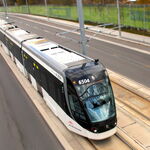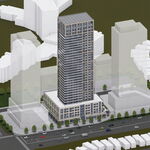pman
Senior Member
Right, the Jarvis bike lanes were killed by Denzil Minnan-Wong, a suburban Councillor with no connection to Jarvis and an antideluvian view of city planning.
I'm not positive the problem is structural -- or at least not solely structural; the most acute problem is personnel (i.e the mopes who occupy at least 2/3 of council).
If we had a better collection of more thoughtful, reasonable councillors who actually cared to consider expert advice, seek out best practices from other jurisdictions, and so on, the current system could work quite well. There are very few structural limitations on the implementation of good ideas in exactly the same way that there are very few structural limitations on the implementation of horrendous ideas, but the real problem is the calibre of the individuals we have operating within that structure.
Now, that sort of does bring one back around to other structural weaknesses -- namely, in the way that we elect those folks -- so maybe I'm talking myself in a circle, but I think I bristle at the notion that the problem is inanimate mostly because it's just truly astonishing how shitty most councillors are and how rarely they're held accountable and I think it's important not to lose sight of that.
Personally, I think the answer to that is simple: While Toronto dithers about how many councillors they should have and where ward boundaries should be, they have never done a proper governance review, dating back to amalgamation. Could the mayor have more power? Should s/he? Should there be a mix of ward and regional/citywide/old-suburb councillors? What about no ward councillors at all? Could the executive committee be configured differently? What about the community councils? What about participatory budgeting? What about ranked ballots? Should we have parties?
I could cherry pick what I think the optimal system might be but what's really important here is that, even within the confines of their existing powers under the City of Toronto Act, council has spent ZERO time thinking about this in the past 20 years. A more in-depth discussion would be worthy of another thread but IMHO, the city does need a different system than it has and they don't really care; they just keep stumbling along and muddling through and whether it's this issue or the Gardiner Hybrid or the Scarborough subway or Mammo taking the city to the OMB over ward boundaries or a bunch of lazy incumbents refusing to implement ranked ballots or employ the tax powers the province gave them, after years of begging, I think the worst possible argument is that things by and large function just fine right now.
Perfect analysis.The structure begets the personnel and the personnel then entrench the structure. It's a downward spiral. I don't know which, among many, alternative governance structures would be most suitable for Toronto. There are many to pick from. What I do know, after witnessing this combination of arrogance and stupidity time and time again, is that parochial, ward based decision making is no way to build a large city. Politicians should be constrained to allocating and managing money made available to them. Things like infrastructure must be understood in city-wide terms and be based on evidence and analysis, and combine land use, economic development, housing policy, pedestrian safety, and a range of other factors that require long term, big picture thinking.
Toronto has a decades long pattern, regardless of the ideological composition of Council and the Mayor, that results in doing things (and in many cases not doing things , e.g. DRL) that no other city in the world its size does. I'm thinking here of a subway in the middle of a truncated expressway, Sheppard stubway, SSE, Gardiner Hybrid, SmartTrack, and $33 billion in unfunded projects, many of which arose in someone's head who then inflicted that scheme on the rest of us by virtue of holding public office. The common thread is that these "things" are always the result of intensely localized and parochial concerns, pandered to and in some cases created by local career politicians with no particular expertise in anything other than reminding us of their overdeveloped sense of self-importance.
The structure begets the personnel and the personnel then entrench the structure. It's a downward spiral. I don't know which, among many, alternative governance structures would be most suitable for Toronto. There are many to pick from. What I do know, after witnessing this combination of arrogance and stupidity time and time again, is that parochial, ward based decision making is no way to build a large city. Politicians should be constrained to allocating and managing money made available to them. Things like infrastructure must be understood in city-wide terms and be based on evidence and analysis, and combine land use, economic development, housing policy, pedestrian safety, and a range of other factors that require long term, big picture thinking.
Toronto has a decades long pattern, regardless of the ideological composition of Council and the Mayor, that results in doing things (and in many cases not doing things , e.g. DRL) that no other city in the world its size does. I'm thinking here of a subway in the middle of a truncated expressway, Sheppard stubway, SSE, Gardiner Hybrid, SmartTrack, and $33 billion in unfunded projects, many of which arose in someone's head who then inflicted that scheme on the rest of us by virtue of holding public office. The common thread is that these "things" are always the result of intensely localized and parochial concerns, pandered to and in some cases created by local career politicians with no particular expertise in anything other than reminding us of their overdeveloped sense of self-importance.
Imagine what Rob Ford would have done with a lot more power.
However, I admit that our political structure can never change, so the question becomes how to defang the Mayor and Council.
It’s a fair point about democracy. But why should “Toronto” be what it is today? What’s democratic about aggregating the inner core with radically different suburbs in one political entity? Why aren’t Brampton, Mississauga and Pickering also part on Toronto? For that matter, the amalgamated city was imposed on us by the Harris government over the wishes of the people involved -hardly democratic. Finally, as Harris demonstrated, under our democracy the elected government has the right to do whatever it wants to municipalities. I want the elected elected provincial government to assert its rights and fix the mess Council has made, and that doesn’t strike me as opposing democracy.I feel like a lot of the complaints are just about democratic governments in general. The inner suburbs are more than two thirds of the city's population, so why shouldn't they have a majority of the seats on city council? And if we're just going to blindly defer to "experts", what's the point of having a democratic government at all? And what do we do when the "experts" come up with something monumentally stupid?
Gord Perks had some good Twitter comments this week, where he basically said that no, we shouldn't have blind faith in experts and politicians are supposed to interfere with experts when they feel that they're wrong. At some point it just becomes an issue of value differences, and neither side is wrong - they just don't agree on what the city's priorities should be.
To complicate the matter:But we also need to elect politicians capable of doing that instead of sticking their heads up their proverbial butts. Democracy is messy (why, just look to the country to the south!) but, as pman also rightly points out, most of Toronto is suburban and its as incumbent on downtown residents to suck it up and acknowledge that as it is for suburban councillors to think of a bigger picture than what's in their own wards.
https://www.thestar.com/news/gta/2018/03/03/pedestrian-struck-in-scarborough-dies-in-hospital.html
14 dead pedestrians since the beginning of the year. Those on council who refuse to design streets for anything other than vehicle use need to be held morally responsible for these deaths.




